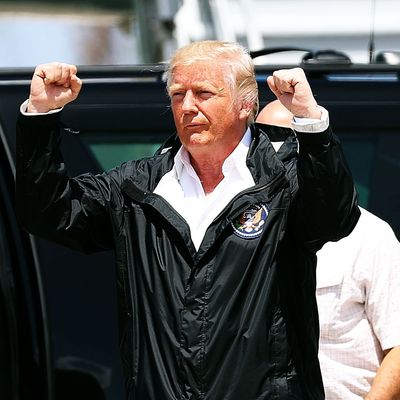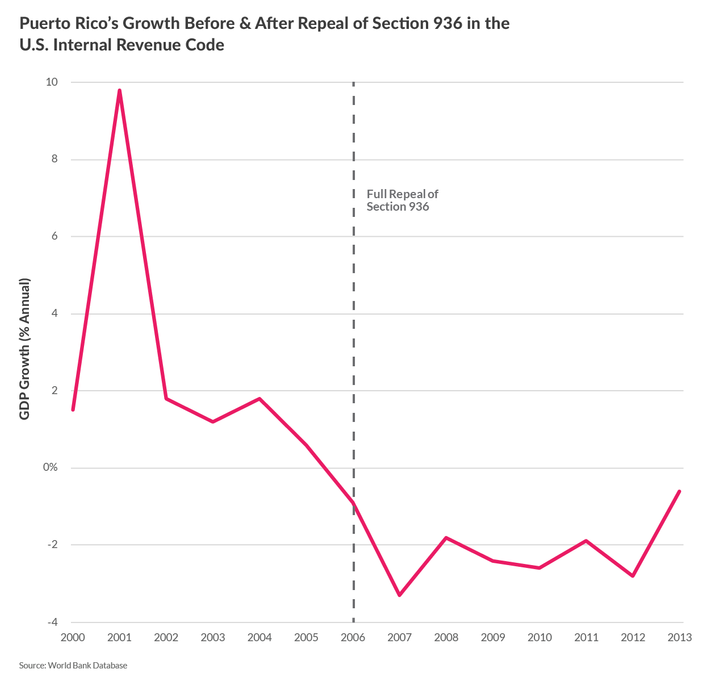
On Wednesday, the Environmental Protection Agency implored Puerto Ricans not to drink from wells at hazardous-waste sites, no matter how thirsty they might be. That piece of advice came amid reports that the island’s residents were searching Superfund sites for potable water. At present, more than one-third of Puerto Ricans lack access to clean drinking water. Only 16 percent of the territory’s residents have electricity.
On Thursday, President Trump announced that Puerto Rico had “survived the Hurricanes,” and was now suffering primarily from a “financial crisis …largely of their own making.” Therefore, it was time for the United States to start thinking about winding down relief efforts. After all, “We cannot keep FEMA, the Military & the First Responders, who have been amazing (under the most difficult circumstances) in P.R. forever!”
The U.S. military has been in Afghanistan for 16 years. Two months ago, Trump approved a plan to keep it there indefinitely. But after less than a month in Puerto Rico — with hundreds of thousands of American citizens living in preindustrial, often life-threatening conditions — it’s time to we started talking about bringing the troops home.
The grotesque callousness of Trump’s tweets will be obvious to anyone who sees Puerto Ricans as human beings. While the hurricane’s official death toll currently stands at 45, there’s reason to believe that’s off by hundreds. It’s possible that the number of people killed by the storm’s immediate effects is near the official count. But Puerto Rico’s population is disproportionately elderly — and its elderly population is disproportionately impoverished. The vast majority of the island has gone without electricity for weeks, amid high temperatures and limited access to water. Vox’s examination of local news reports since Hurricane Maria found 81 deaths linked directly or indirectly to the storm, hundreds more with causes unknown, and reports of 69 people missing.
Puerto Rico has not “survived” the hurricane — residents of the island are still fighting for their literal survival, as Trump tweets. The president is right that much of this suffering is more the product of political failures than of the natural disaster itself. But he’s wrong about who needs to take responsibility for that fact. The Trump administration had ample warning that a Category 4 storm was likely to hit Puerto Rico — and that the island’s electrical grid was unlikely to survive such an onslaught. The federal government had time to deploy satellite phones to the island, to avoid the communications blackout that isolated remote areas from the territory’s government. It could have delivered reserves of food, fuel, and water to the island in advance of the storm, allowing local officials to spread these vital resources throughout the territory, before Maria lay waste to much of its trucking infrastructure. But instead, our president did almost nothing in the lead-up to the storm — and went on a four-day golf vacation in its aftermath.
A less obviously mendacious piece of Trump’s remarks is his suggestion that the U.S. government bears little responsibility for Puerto Rico’s financial crisis. The authors of that crisis are many, and include plenty of the island’s own officials. But federal lawmakers should shoulder a significant portion of the blame.
For over 80 years, the federal government used tax breaks to coax corporations into operating in Puerto Rico, so as to boost the island’s industrialization and keep tax-allergic companies on (pseudo-)American soil. The most significant of these was “Section 936” — a provision of the tax code which gave U.S. companies an exemption on all income originating from American territories. After the provision was passed in 1976, manufacturers and pharmaceutical companies flooded the island with jobs. Manufacturing became the single most important sector in Puerto Rico’s economy.
But the island’s competitiveness rested on those tax breaks — Puerto Rico has the same minimum wage as the United States and its workers are less productive. In the ’90s, anger over outsourcing and corporate tax evasion led Congress to phase out Section 936. By 2006, the exemptions were history and so was Puerto Rico’s manufacturing boom. The territory has been in recession ever since.

In essence, Washington legislated a manufacturing bubble on the island, and then popped it — reshaping the economic fortunes of millions of American citizens, without giving their elected representatives any (direct) say in the matter.
Once Section 936 expired, Puerto Rican officials had few good options for arresting their economy’s precipitous decline. Racking up massive, unpayable debts was, certainly, an especially bad one. And yet, the federal government still bears significant responsibility for the fact that the island decided to take that route.
By making Puerto Rico’s bonds “triple tax exempt” — meaning their interest payments go untaxed by federal, state, and local government — Congress ensured that the island’s debt would remain a hot commodity for mutual funds, even as its economy languished. And unlike counties and cities in American states, when Puerto Rico’s creditors finally demanded what they were owed, the island had no access to the Chapter 9 bankruptcy process.
And all the while, the U.S. government has saddled Puerto Ricans with a cost of living 13 percent higher than in 325 American cities – despite the fact that per-capita income on the island is just $18,000. This extraordinary state of affairs is largely the product of the Jones Act, a century-old American law that requires all cargo carried between U.S. ports (including those in Puerto Rico) to be transported on ships made, owned, and staffed by Americans. Essentially, this policy boosts shipping employment in a few American municipalities, at a multibillion-dollar cost to the Puerto Rican economy.
In sum: The U.S. government has shown a total lack of accountability for a financial crisis largely of its own making. We cannot keep Trump, his incompetent cronies, and compassionless congressional allies, who have been asleep at the wheel (in the most unforgivable circumstances), in power forever!






























